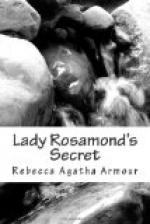The entrance of Mr. Howe changed the current of conversation. Politics naturally took the lead. The House of Assembly being now three weeks in session, having opened April 15th, many important discussions took place. Much turmoil had to be suppressed by the sagacious judgment of Sir Howard. His predecessors had loudly contended against the troubles arising from the sources and expenditure of revenues. Happily, in the present administration, this matter had in a great measure subsided. For the general advancement of the Province, His Excellency left no means untried. His waking moments were almost entirely devoted to the interests of political welfare. His conversation within the family circle very often showed his zeal and the subject which lay near his heart. It was at this very time that he assembled all the legislators and influential citizens of Fredericton, addressing them in terms of burning eloquence, impressing on them the value of extending the progress of agriculture, showing the nature of the soil of New Brunswick; its perfect adaptation to the different kinds of products, and the independence of a country that can largely subsist upon its own resources. “The day will come, I hope,” said Sir Howard, “when our farmers will be nobles of our land, and their sons and daughters ornaments to society, proud of the soil which raised them above the level of their less active fellow creatures.”
As the speech had given rise to much comment throughout the different classes, it was freely discussed at Government House. This intelligent family often formed into a party of politicians and assumed the measured terms and knotty difficulties of political lore with an ease that was both instructive and amusing.
“If papa would favor this august assembly by taking the floor of the house, we might be more free to avow our feelings.”
“I beg you will allow me to correct you, Miss Mary, as being rather sentimental in the choice of your last word,” said Mr. Howe, appealing to Sir Howard with the question, “Your Excellency, have I not a right to make the correction?”
“I acknowledge your suggestion, Mr. Speaker,” said Mary Douglas in her own defence, “and hope, before the session is over, to make a decided improvement both in views and technicalities.”
“What!” exclaimed Captain Douglas, coming towards Mr. Howe. “Are you and Mary to take opposite measures already?”
“Not at all, sir,” returned Mr. Howe, “I was merely setting her right on—” “technicalities,” said the young girl, with a merry ringing laugh.
“Ah, Mary!” cried Charles Douglas, playfully pulling back the clustering ringlets from his sister’s white forehead, “poetry and politics cannot exist on very intimate terms of friendship, at least too much poetry.”
“Have a care, young man,” said Sir Howard, laughing at the last remark.
“Ah! there are exceptions to every rule, sir, which you did not give me an opportunity to add, and I still make the former assertion to be, to a certain extent, counterbalanced by the latter.”




